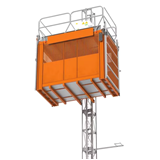The loss of momentum was driven by a decline in activity (down 6.7 points to 47.4) and new orders (down 8.5 points to 44.0) across all four construction industry sub-sectors in November. This contributed to a steeper fall in construction employment (down 8.5 points to 42.0) and a sharp deceleration in deliveries from suppliers (down 8.9 points to 50.1, indicating stability in deliveries).
Across the four construction sub-sectors in the Australian PCI, the house building sub-sector continued to expand, but it decelerated to its slowest pace since March 2014 (down 5.5 points to 51.8). Apartment building activity also recorded an easing in the rate of growth (down 2.4 points to 58.0) in response to a second consecutive month of declining new orders.
Weaker engineering construction
Engineering construction exhibited weaker conditions in November, with activity declining at a steeper pace in November (down 1.1 points to 45.3), while commercial construction also moved into contraction, ending four months of growth (down 5.8 points to 46.0).
Ai Group Chief Economist, Julie Toth, said: "Survey respondents attributed this month's deterioration in conditions to a decline in new tendering opportunities, slow public building activity, project delays and a further decline in new mining-related construction projects.
"While one month's data does not necessarily indicate a new trend, this slower pace of building activity was also reflected in slightly lower building approvals for detached houses in October and September (released this week) and in the latest GDP estimates for Q3 for Australia. These data really underscore the fragile and sporadic nature of the current recovery in residential housing activity, especially as we move into the end of year shut-down period for much of the industry," Toth said.
"Variety of components"
HIA Chief Economist, Harley Dale, said: "The weakening in the Australian PCI in November was driven by a variety of components, of which a broad-based contraction in new orders is the most concerning. Perceptions regarding Australia's short-term economic outlook have dampened recently and today's result will hardly buoy the prevailing mood.
"The rate of expansion in detached house and apartment building activity slowed in November, but at least both these sub-indices remained in the black. It will be disappointing if the rate of expansion in these Australian PCI components fails to re-accelerate in coming months given new home construction is currently the key domestic sector with promise of healthy activity in 2015."
Australian PCI – Key Findings for November
- The Ai Group/HIA Australian Performance of Construction Index (Australian PCI) contracted for the first time since May 2014 in November, falling 8.0 points to 45.4.
- Significant decelerations were seen in the indexes for construction activity (down 6.7 points to 47.4), new orders (down 8.5 points to 44.0) and deliveries from suppliers (down 8.9 points to 50.1).
- Across the four sub-sectors: house building continued to expand, but at a slower rate of growth (down 5.5 points to 51.8); apartment building remains solid but dropped 2.4 points to 58.0; and commercial construction contracted for the first time since June 2014 (down 5.8 points to 46.0). Engineering construction continued to exhibit weaker conditions than the other sub-sectors (down 1.1 points to 45.3).
- The construction employment sub-index dropped steeply after four consecutive months of indicating growth (readings above 50 points), falling 8.5 points to 42.0.
- Pressures on profit margins remain strong: growth in the wages sub-index moderated slightly (down 1.2 points to 57.4); input costs picked up by 2.0 points to reach 74.5; and selling prices dropped by 6.0 points to 45.2, suggesting price cuts as builders seek to secure work in a tightening market.











-160x160-state_article-rel-cat.png)



-160x160-state_article-rel-cat.png)








